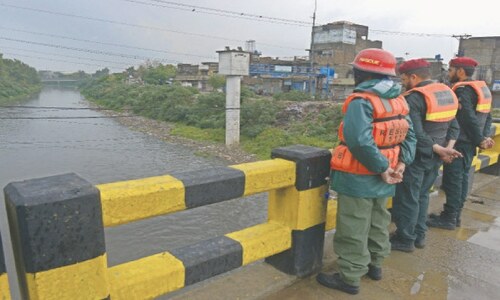ISLAMABAD: The job of law enforcement agencies is to ensure that sentences handed down to felons and convicted criminals are carried out. But a recent case, where a senior government official ‘rescued’ a narcotics smuggler, convicted by a British court, has raised many eyebrows among legal circles.
In 2004, a British court sentenced Asad Javed, a Pakistani national, to 25 years in prison for drug trafficking and, under a bilateral agreement on repatriation of condemned prisoners, he was brought to Pakistan in 2010 to complete his sentence.
But ‘corrupt’ elements within the Ministry of Interior and police force allegedly obtained his released on ‘forged’ documents.
Accused used connections in interior ministry to forge release papers, fool inspection team
In 2012, when the British government found out about the illegal release of their convict, they stopped the repatriation of criminals to Pakistan.
As per the FIR registered with the Federal Investigation Agency’s (FIA) Crimes Circle on March 28 of this year, Asad Javed was arrested under Section 4 (1) of the misuse of Drugs Act 1971.
The Crown Court at Southwark, United Kingdom (UK) convicted him and awarded him 25 years imprisonment.
Since Pakistan and UK have domestic laws for repatriation of convicted prisoners to their respective countries and both are signatories to the bilateral agreement of August 24, 2007, Javed was handed over to Pakistani authorities on August 8, 2010 to serve out his remaining sentence.
But Javed was released from the Karachi Central Jail on September 9, 2010 after the home department granted him a remission, as per documents produced by FIA in court.
According to the documents, a section officer at the Interior Ministry, Ali Mohammad Malik, orchestrated Javed’s release by forwarding forged letters to the Central Jail authorities, helping the walk free and eventually flee to Dubai.
However when the British government learned that Javed had been released, they formally approached the interior ministry and demanded that they be allowed to verify the prisoner’s presence in jail.
According to FIA investigators, section officer Malik then asked Javed to return to Pakistan for a few days.
Once back, he was booked for the minor charge of possession of alcohol and sent back to the ajil where officials of the British High Commission and a representative of the interior ministry verified his presence through biometric verification.
After the visit, however, Javed walked free after posting bail for the minor offence he was charged with.
But when the British High Commission pursued the matter further, the FIA began its own investigation and found that the section officer of had unlawfully granted a remission to Javed, which led to his early release.
An FIR was registered the case against both – Javed and section officer Malik – for fraud, breach of trust and abetment and produced them before an FIA special judge.
The judge then sent them to jail on judicial remand. Subsequently, both applied for post arrest bail before the Islamabad High Court (IHC).
In court, the accused contended that the British government had introduced the ‘Prisoners Early Release Scheme’ in 2007 to reduce the burden on overcrowded prisons.
The lawyer for the accused duo argued that if Javed was in UK, he would have been released by November 2010, therefore his release in the same year was legal.
Barrister Jahangir Khan Jadoon, standing counsel for the federal government, stated that the convict was brought back to Pakistan to serve out the remainder of his sentence, but obtained his release on the basis of forged documents.
IHC Justice Noorul Haq N. Qureshi, announcing the judgment observed that the conduct of the convict petitioner was “astonishing”.
The judge ruled, “I am not inclined to grant bail to the petitioner. Hence bail petition is dismissed.”
The court then remanded the case back to the FIA for proceedings against both the accused.
Published in Dawn, December 14th, 2014















































